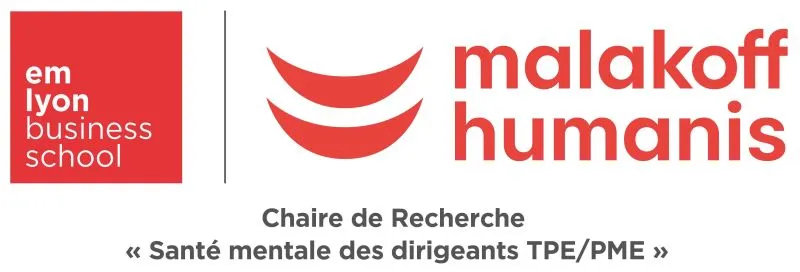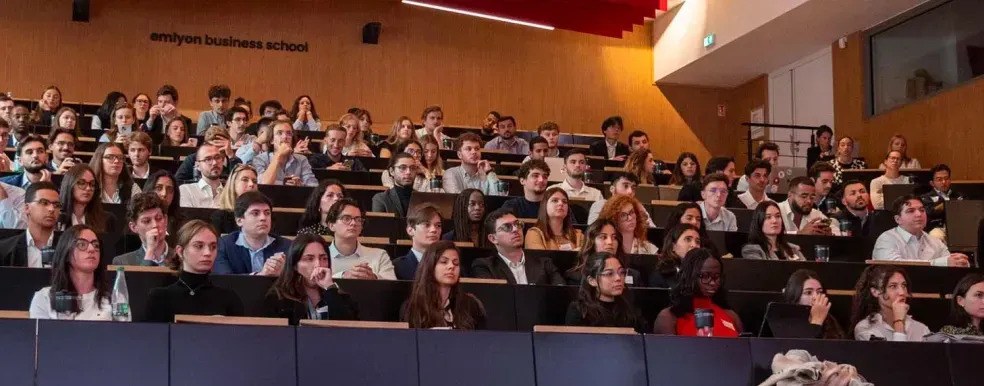Recherche en santé & Chaire
Recherche
La recherche à emlyon vise à éclairer les débats économiques et sociaux sur un large éventail de sujets. Les travaux des membres de l'Institut HITS portent sur les déterminants de la demande de soins (par exemple le comportement d'assurance des individus) comme sur des problèmes d'offre (optimisation des chaînes d'approvisionnement et la logistique médicale, mesures de performance des établissements hospitaliers), sur des questions de santé au travail (engagement des salariés, santé mentale des dirigeants, effets des incitations), et sur des enjeux de R&D (tels que l'application de l'intelligence artificielle à la biologie) pour la diffusion de nouveaux médicaments et vaccins.

Publications scientifiques récentes
- Baillon A., O'Donnell O., Quimbo S., van Wilgenburg K., 2022, “Do time preferences explain low health insurance take-up?,” Journal of Risk and Insurance, vol. 89:4, 951-983.
- Baillon A., Capuno J., O'Donnell O., Tan C. A. Jr., van Wilgenburg K., 2022, “Persistent effects of temporary incentives: Evidence from a nationwide health insurance experiment," Journal of Health Economics, vol 81, 102580.
- Baillon A., Kraft A., O'Donnell O., van Wilgenburg K., 2022, “A behavioral decomposition of willingness to pay for health insurance,” Journal of Risk and Uncertainty, vol 64:1, pp. 43-87.
- Ramzy G. M., Norkin M., Koessler T., Voirol L., Tihy M., Hany D., McKee T., Ris F., Buchs N., Docquier M., Toso Ch., Rubbia-Brandt L., Bakalli G., Guerrier S., Huelsken J. and Nowak-Sliwinska P., 2023, “Platform Combining Statistical Modeling and Patient-Derived Organoids to Facilitate Personalized Treatment of Colorectal Carcinoma,” Journal of Experimental & Clinical Cancer Research, Vol. 42, article number 79.
- Miglioli C., Bakalli G., Orso S., Karemera M., Molinari R., Guerrier S., and Mili N., 2022, “Evidence of Antagonistic Predictive Effects of miRNAs in Breast Cancer Cohorts Through Data-Driven Networks,” Scientific Reports, 12(5166), pp. 1-16.
- Parisi N., Janier-Dubry A., Ponzetto E., Pavlopoulos Ch., Bakalli G., Molinari R., Guerrier S., and Mili, N., 2021, “Non Applicability of Validated Predictive Models for Intensive Care Admission and Death of COVID-19 Patients in a Secondary Care Hospital in Belgium,” Journal of Emergency and Critical Care Medicine, 5(22), pp. 1-13.
- David R., Evans R., Fraser H., 2021, “Modelling Prenatal Care Pathways at a Central Hospital in Zimbabwe,” Health Services Insights, 14: 13 p.
- Zad, Z., Bonecker, S., Wang, T., Zalcberg, I., Stelzer, G. T., Sabioni, B., Gutiyama, L. M., Fleck, J. L., Paschalidis, I. Ch., 2024, “Prediction of deep molecular response in chronic myeloid leukemia using supervised machine learning models,” Leukemia Research, 141, 107502.
- Fleck J. L., Hooijenga D., Phan R., Xie X., Augusto V., Heudel P.-E., 2023, “Adjuvant therapeutic strategy decision support for an elderly population with localized breast cancer: A monocentric cohort retrospective study,” PLoS ONE, 18(8): e0290566.
- Becker, L., Fischer, F., Fleck, J. L., Harland, N., Herkommer, A., Stenzl, A., Aicher, W.K., Schenke-Layland, K., Marzi, J., 2022, “Data-driven identification of biomarkers for in situ monitoring of drug treatment in bladder cancer organoids,” International Journal of Molecular Sciences, 23, 6956.
- Ma, P., Gong, Y., & Jin, M., 2019, “Quality efforts in medical supply chains considering patient benefits,” European Journal of Operational Research, 279(3), 795-807.
- Hong, Z., Li, Y., Gong, Y., & Chen, W., 2022, “A data-driven spatially-specific vaccine allocation framework for COVID-19,” Annals of Operations Research, 1-24.
- Chen, W. A., De Koster, R. B., & Gong, Y., 2021, “Performance evaluation of automated medicine delivery systems,” Transportation Research part E: Logistics and Transportation Review, 147, 102242.
- Seppälä, P., Harju, L. K., Virkkala, J., & Hakanen, J. J., 2023, “Is boredom at work bad for your health? Examining the links between job boredom and autonomic nervous system dysfunction,” Stress and Health. https://doi.org/10.1002/smi.3326
- Harju, L. K., Seppälä, P., & Hakanen, J. J., 2023, “Bored and exhausted? Profiles of boredom and exhaustion at work and the role of job stressors,” Journal of Vocational Behavior, 144, https://doi.org/10.1016/j.jvb.2023.103898
- Harju, L. K., Van Hootegem, A., & De Witte, H., 2022, “Bored or burning out? Reciprocal effects between job stressors, boredom and burnout,” Journal of Vocational Behavior, 139, https://doi.org/10.1016/j.jvb.2022.103807
- Jaotombo F., Adorni L., Ghattas B., Boyer L., 2023, “Finding the best trade-off between performance and interpretability in predicting hospital length of stay using structured and unstructured data,” PLOS ONE, 18(11): 22 p.
- Jaotombo F., Pauly V., Fond G., Orleans V., Auquier P., Ghattas B., Boyer L., 2023, “Machine-learning prediction for hospital length of stay using a French medico-administrative database,” Journal of Market Access & Health Policy, 11 (1): 11 p.
- Jaotombo F., Pauly V., Auquier P., Orleans V., Boucekine M., Fond G., Ghattas B., Boyer L., 2020, “Machine-learning prediction of unplanned 30-day rehospitalization using the French hospital medico-administrative database,” Medicine, 99(49): 7 p.
- Barigozzi, F., Jelovak, I., 2020, “Research funding and price negotiation for new drugs,” Health Economics, 29 (S1), pp. 83-96.
- Jelovak, I., Kembou Nzale, S., 2020, “Regulation and altruism,” Journal of Public Economic Theory, 22(1), pp. 49-68.
- Houy, N., Jelovak, I., 2019, “Comparing approval procedures for new drugs,” The World Economy, 42(5), pp. 1598-1619.
- Liu, X., Zhou, Y., Wang, Z., Kumar, A., Biswas, B, 2024, “Disease topic modeling of users' inquiry texts: A text mining-based PQDR-LDA model for analyzing the online medical records,” IEEE Transactions on Engineering Management, 71, pp. 6319-6337.
- Liu, X., Zhou, Y., Wang, Z., Wang, W., Kumar, A., Wei, W, 2023, “User's cognitive-behavior-based preference access under disease-specific online medical inquiry text mining,” IEEE Transactions on Engineering Management, 70(8) pp. 2827-2845.
- Pal, S., Biswas, B., Gupta, R., Kumar, A., Gupta, S., 2023, “Exploring the factors that affect user experience in mobile-health applications: A text-mining and machine-learning approach,” Journal of Business Research, 156, 113484, pp. 1-15.
- Malik S., Valdebenito S., D'Amico D., Prideaux B., Eugenin E.A., 2021, “HIV infection of astrocytes compromises inter-organelle interactions and inositol phosphate metabolism: A potential mechanism of bystander damage and viral reservoir survival,” Progress in Neurobiology, 206:102157.
- Valdebenito S., Malik S., Luu R., Loudig O., Mitchell M., Okafo G., Bhat K., Prideaux B., Eugenin E.A., 2021, “Tunneling nanotubes, TNT, communicate glioblastoma with surrounding non-tumor astrocytes to adapt them to hypoxic and metabolic tumor conditions,” Scientific Reports, 11(1):14556.
- Gopalakrishnan R.M., Aid M., Mercado N.B., Davis C., Malik S., Geiger E., Varner V., Jones R., Bosinger S.E., Piedra-Mora C., Martinot A.J., Barouch D.H., Reeves R.K., Tan C.S., 2021, “Increased IL-6 expression precedes reliable viral detection in the rhesus macaque brain during acute SIV infection,” JCI Insight, 6(20): e152013.
- Morinière, A., 2023, “Ethical implications of acceleration: Perspectives from health professionals,” Journal of Business Ethics, 188(4), 741-758.
- Morinière, A., and Georgescu, I., 2022, “Hybridity and the use of performance measurement: facilitating compromises or creating moral struggles? Insights from healthcare organizations,” Accounting, Auditing & Accountability Journal, 35(3), 801-829.
- Morinière, A., Baldé, M., Giordano, S., and Villesèque-Dubus, F., 2022, Chapitre 2. “Repenser le pilotage des hôpitaux publics français au regard de la crise de la Covid-19 ,” Reporting et pilotage des organisations pour une société résiliente, Éd. EMS, Management & société, 49-61
- Sayre, G. M. & Conroy, S. A, 2024, “The other side of the coin: An integrative review connecting pay and health,” Journal of Applied Psychology, https://doi.org/10.1037/apl0001151
- Sayre, G. M., 2023, “The costs of insecurity: Pay volatility and health outcomes,” Journal of Applied Psychology, 108(7), pp. 1223-1243.
- Sayre, G. M., Grandey, A. A., & Chi, N.-W., 2020, “From cheery to “cheers”? Regulating emotions at work and alcohol consumption after work,” Journal of Applied Psychology, 105(6), pp. 597-618.
- Manirakiza A., Malaka C., Mossoro-Kpinde H.D., Yambiyo B.M., Mossoro-Kpinde C.D., Fandema E., Niamathe Yakola C., Doyama-Woza R., Kangale-Wando I.M., Kosh Komba J.E., Nzapali Guiagassomon S.M.B., Namsenei-Dankpea L.J.G., Coti-Reckoundji C.S.G., Bouhouda M., Gody J.C., Grésenguet G., Vernet G., Vernet M.A., Nakoune E., 2023, “Seroprevalence of anti-SARS-CoV-2 antibodies before and after implementation of anti-COVID-19 vaccination among hospital staff in Bangui, Central African Republic,” PLOS Global Public Health, 3(11): e0001497.
- Mbrenga F., Nakouné E., Malaka C., Bourner J., Dunning J., Vernet G., Horby P., Olliaro P., 2022, “Tecovirimat for Monkeypox in Central African Republic under Expanded Access,” New England Journal of Medicine, 387(24), pp. 2294-2295.
- Wiens K.E., Jauregui B., Arnold B.F., Banke K., Wade D., Hayford K., Costero-Saint Denis A., Hall R.H., Salje H., Rodriguez-Barraquer I., Azman A.S., Vernet G., Leung D.T., 2022, “Building an integrated serosurveillance platform to inform public health interventions: Insights from an experts' meeting on serum biomarkers,” PLOS Neglected Tropical Diseases, 16(10): e0010657.
- Billette de Villemeur E., Scannell J. W., Versaevel B., 2022, “Biopharmaceutical R&D outsourcing: Short-term gain for long-term pain?,” Drug Discovery Today, 27(11), pp. 1-7.
- Billette de Villemeur E., Dequiedt V., Versaevel B., 2021, “Pool patents to get COVID-19 vaccines and drugs to all,” Nature, 591, p. 529.
- Billette de Villemeur E., Versaevel B., 2019. “One lab, two firms, many possibilities: On R&D outsourcing in the biopharmaceutical industry,” Journal of Health Economics, 65, pp. 260-283.
Chaire
- Santé mentale des dirigeants de TPE - PME
Cette chaire vise à explorer les enjeux de la santé mentale des dirigeants et de leurs salariés, ses représentations et ses conséquences, dans le monde des TPE et des PME. Celui-ci est caractérisé par la position centrale de leurs dirigeants, rarement accompagnés par des gestionnaires opérationnels (responsable des ressources humaines, chef de la sécurité et de la prévention...). C'est pourquoi la question de la santé mentale retombe sur les dirigeants, tant pour eux-mêmes que pour leur personnel.


Nous savons que la pression constante, les défis complexes et les responsabilités accrues peuvent avoir un impact profond sur le bien-être mental. C'est pourquoi nous avons décidé de nous associer à emlyon, une institution à la pointe de la recherche sur la santé et le bien-être au travail, pour mener des travaux de recherche et développer des ressources concrètes visant à soutenir les directeurs exécutifs mentalement fragiles. Les directeurs avec une meilleure santé mentale, tout comme les employés, fournissent des performances supérieures, sont plus créatifs et plus résilients. Prêter attention à ce qu'ils ont à dire et les soutenir est nécessaire pour tous.






